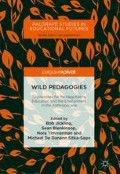Abstract
This chapter presents educators with a conundrum: how to change educational systems so that they can in turn promote learning relevant to and commensurate with the multiple crises we face, without being co-opted by dominant cultural norms. Instead of seeking to integrate environmental and sustainability education into existing educational institutions, the challenge is rather the reverse. The task at hand is really to renegotiate, in conjunction with Earth and the more-than-human world, the idea and practice of education itself. Beneath what appear as crises, such as climate change and species extinctions, a more profound crisis lies in the way that many humans relate to the world—that is the dominant modernist way of being in the world. A renegotiated and renewed vision of education must include structures, curricula, and pedagogies that are fundamentally disruptive to these ways of being.
The Crex Crex Collective includes: Hebrides, I., Independent Scholar; Ramsey Affifi, University of Edinburgh; Sean Blenkinsop, Simon Fraser University; Hans Gelter, Guide Natura & Luleå, University of Technology; Douglas Gilbert, Trees for Life; Joyce Gilbert, Trees for Life; Ruth Irwin, Independent Scholar; Aage Jensen, Nord University; Bob Jickling, Lakehead University; Polly Knowlton Cockett, University of Calgary; Marcus Morse, La Trobe University; Michael De Danann Sitka-Sage, Simon Fraser University; Stephen Sterling, University of Plymouth; Nora Timmerman, Northern Arizona University; and Andrea Welz, Sault College.
Bob Jickling (bob.jickling@lakeheadu.ca) is the corresponding author.
Access this chapter
Tax calculation will be finalised at checkout
Purchases are for personal use only
Notes
- 1.
Sean Blenkinsop, and Marcus Morse, “Saying Yes to Life: The Search for the Rebel Teacher,” in Post-Sustainability and Environmental Education: Remaking Education for the Future, ed. Bob Jickling and Stephen Sterling (London: Palgrave Macmillan, 2017): 49–61.
- 2.
See for example: Janice Astbury, Stephen Huddart, and Pauline Théoret, “Making the Path as We Walk It: Changing Context and Strategy on Green Street,” Canadian Journal of Environmental Education 14 (2009): 158–178; Wayne Au, “Teaching Under the New Taylorism: High-Stakes Testing and the Standardization of the 21st Century Curriculum,” Journal of Curriculum Studies 43, no. 1 (2011): 25–45; Bob Jickling, “Sitting on an Old Grey Stone: Meditations on Emotional Understanding,” in Fields of Green: Restorying Culture, Environment, and Education, ed. Marcia McKenzie, Paul Hart, Heesoon Bai, and Bob Jickling (Cresskill, NJ: Hampton Press, 2009): 163–173; Bob Jickling, “Self-Willed Learning: Experiments in Wild Pedagogy,” Cultural Studies of Science Education 10, no. 1 (2015): 149–161; and William C. Smith, ed., The Global Testing Culture: Shaping Educational Policy, Perceptions, and Practice (Oxford: Symposium Books, 2016).
- 3.
Arjen E.J. Wals, “What You Can’t Measure Still Exists,” The Environmental Communicator 12 (1990): 12.
- 4.
Elliot Eisner, The Educational Imagination. 2nd ed. (New York: Macmillan, 1985).
- 5.
Ibid., 121.
- 6.
Herbert Marcuse, One-Dimensional Man (Boston: Beacon Press, 1964): 57.
- 7.
Winona LaDuke, All Our Relations: Native Struggles for Land and Life (Boston: South End Press, 2008).
References
Astbury, J., S. Huddart, and P. Théoret. “Making the Path as We Walk It: Changing Context and Strategy on Green Street.” Canadian Journal of Environmental Education 14 (2009): 158–178.
Au, W. “Teaching Under the New Taylorism: High-Stakes Testing and the Standardization of the 21st Century Curriculum.” Journal of Curriculum Studies 43, no. 1 (2011): 25–45.
Blenkinsop, S, and M. Morse. “Saying Yes to Life: The Search for the Rebel Teacher.” In Post-Sustainability and Environmental Education: Remaking Education for the Future, ed. Bob Jickling and Stephen Sterling, 49–61. London: Palgrave Macmillan, 2017.
Eisner, E. The Educational Imagination. 2nd ed. New York: Macmillan, 1985.
Jickling, B. “Self-Willed Learning: Experiments in Wild Pedagogy.” Cultural Studies of Science Education 10, no. 1 (2015): 149–161.
———. “Sitting on an Old Grey Stone: Meditations on Emotional Understanding.” In Fields of Green: Restorying Culture, Environment, and Education, ed. Marcia McKenzie, Paul Hart, Heesoon Bai, and Bob Jickling, 163–173. Cresskill, NJ: Hampton Press, 2009.
LaDuke, W. All Our Relations: Native Struggles for Land and Life. Boston: South End Press, 2008.
Marcuse, H. One-Dimensional Man. Boston: Beacon Press, 1964.
Smith, W., ed. The Global Testing Culture: Shaping Educational Policy, Perceptions, and Practice. Oxford: Symposium Books, 2016.
Wals, A. “What You Can’t Measure Still Exists.” The Environmental Communicator 12, no. 1 (1990).
Acknowledgements
Crex crex is the taxonomical name given to the Corncrake. We have chosen this bird to represent our collective because it was an important collaborator in this project and because its onomatopoeic name beautifully mirrors its call—a raspy crex crex. For some reason, it chooses to fly over England and breeds in Scotland and Ireland. Presumably this is due to loss of habitat in modern England, but perhaps these birds sense some epicenter of empire there? Who is to know?
Author information
Authors and Affiliations
Consortia
Corresponding author
Editor information
Editors and Affiliations
Rights and permissions
Copyright information
© 2018 The Author(s)
About this chapter
Cite this chapter
The Crex Crex Collective., Jickling, B. (2018). On Education. In: Jickling, B., Blenkinsop, S., Timmerman, N., De Danann Sitka-Sage, M. (eds) Wild Pedagogies. Palgrave Studies in Educational Futures. Palgrave Macmillan, Cham. https://doi.org/10.1007/978-3-319-90176-3_4
Download citation
DOI: https://doi.org/10.1007/978-3-319-90176-3_4
Published:
Publisher Name: Palgrave Macmillan, Cham
Print ISBN: 978-3-319-90175-6
Online ISBN: 978-3-319-90176-3
eBook Packages: EducationEducation (R0)

